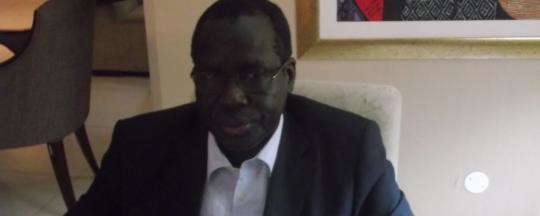South Sudan’s former Justice Minister John Luk, a member of the SPLM ‘Former Detainees’, says that the Establishment Order issued by President Salva Kiir is not constitutional and he has called for suspension of the order.
In a statement together with the other members of the SPLM-FD, John Luk said, “We submit that the Presidential Decree is not in consonance and indeed undermines fundamental provisions of the existing Transitional Constitution of South Sudan.”
“Article 162 (1) stipulates that The territory of South Sudan is composed of ten States governed on the basis of decentralization,” he pointed out.
He continued, “Article 162 (3) stipulates that ‘State boundaries shall not be altered, except by a resolution of the Council of States approved by two-thirds (2/3) of all members. Article 162 (3) stipulates that ‘names of states and their capital towns shall not be altered, except by a simple majority of all members of the Council of States on the recommendation of the relevant State Assembly.”
The former ministers argued in the statement that creation of more states would no doubt complicate the power-sharing ratios that were painstakingly negotiated in the recent peace agreement.
“Whereas the power-sharing ratios were determined on the basis of the existing 10 states, it is now not clear whether that formula would apply to the newly created states, particularly when the President emphatically stated that he will soon appoint the Governors of the new states,” said John Luk.
The statement questioned the basis of the decision of the president, pointing out Article 101 cited by the president as one of the bases of the decision talks about the power of the president to supervise constitutional and executive institutions and provide exemplary leadership.
“Sub-article 101 (k) empowers the President to establish independent institutions and commissions. Sub-article 101 (f) empowers the President to initiate constitutional amendments and legislation and sign bills passed by the National Legislature into law; and finally, sub-article 101 (u) empowers the President to exercise any other function as may be prescribed by law (this presupposes the existence of specific law that gives power to the President and cannot be quoted in vacuum as this Order purports to do).”
“The above Sub-articles of Article 101 should be read in harmony with the competences of the Council of States and the relevant State Assemblies referred to above. Otherwise, the Presidential Order is in violation of the Constitution, particularly the powers of both the Council of States and the Legislatures of the affected States,” said the former justice minister.




